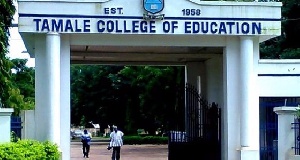 The installation of the Wi-Fi will provide e-learning support to students
The installation of the Wi-Fi will provide e-learning support to students
Twenty-seven public Colleges of Education (CoE) are to benefit from e-learning platforms through the roll-out of connectivity solutions and extension of Wi-Fi services by the National Council for Tertiary Education (NCTE) in partnership with the MasterCard Foundation and UKaid.
This would improve connectivity on the campuses through the installation of Broadband services as well as the upgrading of technology-assisted teaching and learning solutions.
The e-learning support, being part of the wider Mastercard Foundation, Mott MacDonald COVID-19 Recovery and Resilience Programmes, and UKaid Transforming Teacher Education & Learning project, is aimed at extending teacher education through virtual learning.
The initiative supports the NCTE-led Colleges of Education e-learning Fund that was established in consultation with the Conference of Principals of Colleges of Education.
A press release by the NCTE, Mastercard Foundation, and UKaid, copied to the Ghana News Agency in Accra on Wednesday, said over the past semester the Council had noticed that poor Wi-Fi connectivity hampered the efforts of some of the colleges to deliver virtual lessons to students in observance of the COVID-19 restrictions.
“This led to the decision to set up a process to identify Colleges of Education with significant connectivity challenges and to develop appropriate solutions to enable them to continue training the teachers of tomorrow,” Prof Mohammed Salifu, the Executive Secretary of the NCTE, was quoted as saying.
Following a call to action, the release said the colleges submitted applications for financial and technical support and after a thorough review process, led by an Evaluation Committee, 27 applicants were selected and awarded a grant of GH¢20,000 together with a technical assistance to deploy and extend Wi-Fi services to their campuses.
The grant awardees, it said, were selected based on evidence that demonstrated a genuine need for investment in improved connectivity to enhance teaching and learning and demonstrable understanding of the technical and financial requirements and sustainability of the solutions proposed.
“At a time like this, enabling equitable access to education is critical to ensure that our teacher trainees receive the needed instructions, through virtual learning, to be better prepared to impact knowledge and build the capabilities of our young people so they can access dignified and fulfilling work,” Madam Nathalie Gabala, the Regional Head for Western, Central and Northern Africa at the Mastercard Foundation, was quoted as saying.
Mr Philip Smith, the Development Director of the UK Government’s Foreign, Commonwealth & Development Office (FCDO) in Ghana, on his part, said: “Teachers are the backbone of the education system and for enabling all children to learn, whether in a school building or not.”
He said it was, therefore, vital for Ghana’s student teachers to continue studying for their teaching degrees through virtual channels where necessary, and for connectivity barriers to be removed.
“This is especially important for students who are females, have disabilities, or are in remote areas,” he was quoted as saying.
The Council was in the process of signing agreements and disbursing funding to the beneficiary Colleges of Education, the release said.
The NCTE was established by an Act of Parliament (ACT 454) to oversee the proper administration of institutions of tertiary education in Ghana, provide for the composition of the Council, and provide for related matters.
The Mastercard Foundation, established in 2006, works with visionary organisations to enable young people in Africa and in indigenous communities in Canada to access dignified and fulfilling work.
It is one of the largest, private foundations in the world with a mission to advance learning and promote financial inclusion to create an inclusive and equitable world.